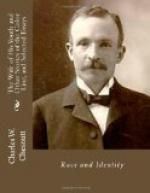“I would n’t min’ it, Mars Dick, ez long ez you ‘d take keer er me an’ fetch me home all right.”
Tom’s eyes belied his words, however, and his young master felt well assured that Tom needed only a good opportunity to make him run away. Having a comfortable home, and a dismal prospect in case of failure, Tom was not likely to take any desperate chances; but young Owens was satisfied that in a free State but little persuasion would be required to lead Tom astray. With a very logical and characteristic desire to gain his end with the least necessary expenditure of effort, he decided to take Tom with him, if his father did not object.
Colonel Owens had left the house when Dick went to breakfast, so Dick did not see his father till luncheon.
“Father,” he remarked casually to the colonel, over the fried chicken, “I ’m feeling a trifle run down. I imagine my health would be improved somewhat by a little travel and change of scene.”
“Why don’t you take a trip North?” suggested his father. The colonel added to paternal affection a considerable respect for his son as the heir of a large estate. He himself had been “raised” in comparative poverty, and had laid the foundations of his fortune by hard work; and while he despised the ladder by which he had climbed, he could not entirely forget it, and unconsciously manifested, in his intercourse with his son, some of the poor man’s deference toward the wealthy and well-born.
“I think I ’ll adopt your suggestion, sir,” replied the son, “and run up to New York; and after I ’ve been there awhile I may go on to Boston for a week or so. I ’ve never been there, you know.”
“There are some matters you can talk over with my factor in New York,” rejoined the colonel, “and while you are up there among the Yankees, I hope you ’ll keep your eyes and ears open to find out what the rascally abolitionists are saying and doing. They ’re becoming altogether too active for our comfort, and entirely too many ungrateful niggers are running away. I hope the conviction of that fellow yesterday may discourage the rest of the breed. I ’d just like to catch any one trying to run off one of my darkeys. He ’d get short shrift; I don’t think any Court would have a chance to try him.”
“They are a pestiferous lot,” assented Dick, “and dangerous to our institutions. But say, father, if I go North I shall want to take Tom with me.”
Now, the colonel, while a very indulgent father, had pronounced views on the subject of negroes, having studied them, as he often said, for a great many years, and, as he asserted oftener still, understanding them perfectly. It is scarcely worth while to say, either, that he valued more highly than if he had inherited them the slaves he had toiled and schemed for.
“I don’t think it safe to take Tom up North,” he declared, with promptness and decision. “He ’s a good enough boy, but too smart to trust among those low-down abolitionists. I strongly suspect him of having learned to read, though I can’t imagine how. I saw him with a newspaper the other day, and while he pretended to be looking at a woodcut, I ’m almost sure he was reading the paper. I think it by no means safe to take him.”




